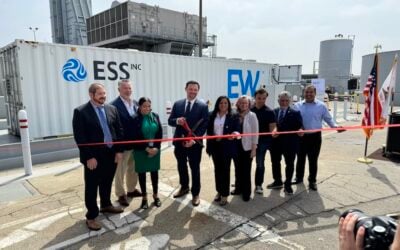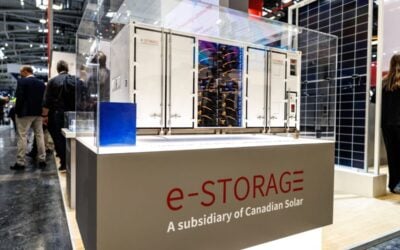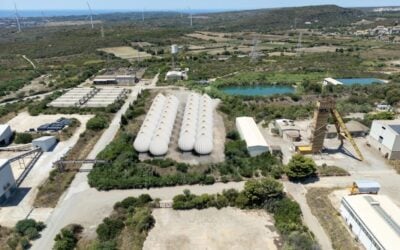
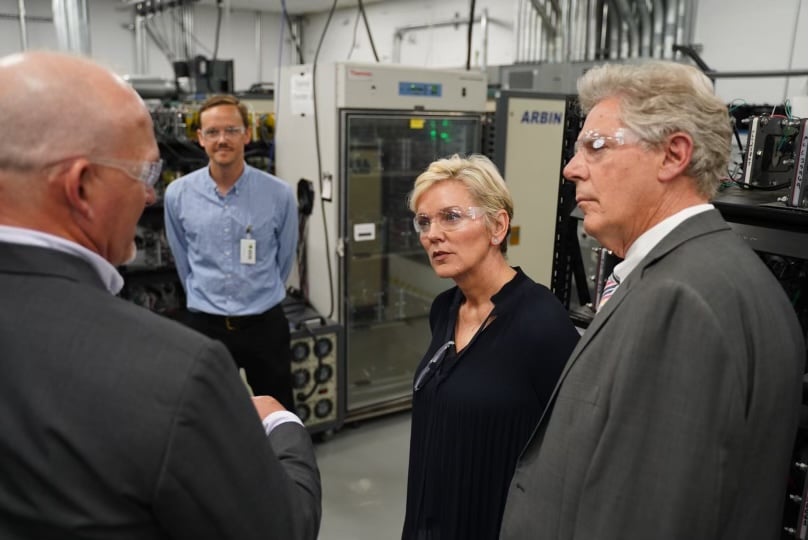
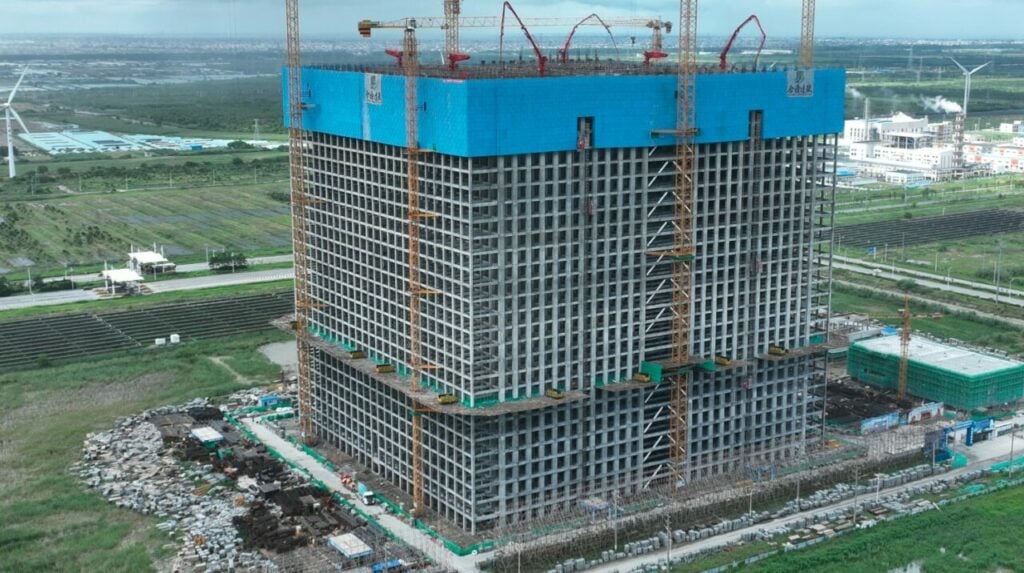
Eos Energy Enterprises, ESS Inc and Energy Vault have increased their revenues and narrowed losses, according to financial results from the three ‘non-lithium’ energy storage companies.
The trio, which all listed their stock publicly following mergers with special purpose acquisition companies (SPACs) during the first two years of the COVID-19 pandemic, have reported their latest quarterly and full-year 2023 results in the past couple of weeks.
Enjoy 12 months of exclusive analysis
- Regular insight and analysis of the industry’s biggest developments
- In-depth interviews with the industry’s leading figures
- Annual digital subscription to the PV Tech Power journal
- Discounts on Solar Media’s portfolio of events, in-person and virtual
In each case, despite improvements in various metrics, guidance as to when the technology providers expect to become profitable on a sequential basis has not been provided.
Meanwhile, stock prices – which listed at US$10 as is customary for entities listing after SPAC business combinations – continue to remain low: ESS Inc’s was at US$0.81 (NYSE), Eos’ at US$1.00 (NASDAQ) and Energy Vault’s US$1.90 (NYSE) as trading closed yesterday (13 March).
Back in August 2023, Energy-Storage.news Premium reported that the three companies and Stem Inc, which also listed after a SPAC merger, had seen their share price fall on average by 80% since listing by that time.
As Energy-Storage.news covered Eos, ESS Inc and Energy Vault’s financials collectively for Q3 2023, we will continue to do so here.
Energy Vault
In financial terms, the Swiss-US technology company behind a novel gravity-based energy storage system (ESS) appears to be best off.
Energy Vault reported full-year 2023 (FY 2023) revenue of US$341.5 million, an increase of 134% year-on-year and within its annual guidance range, while its cash position at the end of the year stood at US$146 million with no debts, beating previously offered guidance of US$132 million.
However, adjusted non-GAAP EBITDA was -US$62.1 million for the full year 2023, versus -US$11.36 million for 2022 while net loss (GAAP) was US$98.4 million, increased from US$78.3 million as of the end of 2022.
As with the other two companies covered in this article, Energy Vault did have some operational highlights to talk about.
These included the near-completion of its first multi-megawatt gravity energy storage project in China, which has now connected to the grid, and the start of work on three more in the country. Energy Vault claimed the four projects will generate high margin recurring royalty revenue streams.
The company also signed a licensing deal for its gravity storage tech in South Africa and is working with a US utility to develop and deploy gravity energy storage.
As regular readers of Energy-Storage.news will know, Energy Vault has also diversified to add more familiar technologies to its offerings, namely lithium-ion (Li-ion) battery storage, green hydrogen, and software-as-a-service (SAAS).
While revenues for each business area were not broken out in presentation materials seen by Energy-Storage.news, three large-scale lithium-ion battery energy storage system (BESS) projects in the US built with Energy Vault’s proprietary design will likely have made a big contribution to its revenues.
Two have been recently completed and commissioned while the third is set to go online during this quarter. The company also expects to have its first green hydrogen project online in Q2 2024, for which it has signed a 10.5-year tolling agreement with utility Pacific Gas & Electric (PG&E) in California.
Energy Vault claimed it has reduced the time it expected to take to reach profitability on an adjusted EBITDA basis, through cost reductions that took effect from the final quarter of 2023 and projected to result in 25 – 30% lower operating expenses in 2024.
After listing in Spring 2021, the highest the company’s stock price has reached since was US$18.32, in April 2022.
Eos Energy Enterprises
Eos Energy Enterprises is the manufacturer of a proprietary zinc-based battery technology, aimed at providing medium to long-duration energy storage (LDES).
The company earned US$16.4 million in revenue during 2023, down from US$17.9 million the prior year. However, it expects to earn between US$60 million and US$90 million in 2024 and the company said – as it has done in the past – that its ability to turn a profit relies largely on implementation of automated production lines.
That process is already underway, and the company claimed it has further reduced costs and improved its value proposition with the development during last year of its third generation Z3 battery product.
The Z3 battery design, “provides improved power density along with lower unit costs from its simpler mechanical design,” CEO Joe Mastrangelo said.
Eos reduced its operating costs year-on-year by 7% to US$79.5 million, as a result of “tighter cost control measures”. Costs of goods sold was also reduced to US$89.8 million, which was a reduction of US$63.5 million from US$153.3 million in 2022, and equivalent to a gross margin improvement of 41%.
Mastrangelo claimed “strong demand signals for long-duration energy storage remain,” and talked up the company’s strategy of basing its production in the US, which will enable it and its customers to avail of higher level tax credit incentives for domestically made clean energy technologies. The company could also yet be a recipient of lending via the US Department of Energy Loan Programs Office to fuel its manufacturing ambitions.
Eos, which listed in June 2020, saw its stock price reach its highest level to date in January 2021, when it hit US$28.83.
ESS Inc
Iron electrolyte flow battery company ESS Inc – which holds the IP for its technology – achieved its highest annual revenues to date in the year ending 31 December 2023 of US$7.5 million. That was below the US$9 million guided in Q3, but a massive increase from the US$610,000 revenue it earned in 2022, the first year it began recognising revenues.
The company talked up a number of partnerships, milestones and customer projects that have progressed, including a first system delivered to Honeywell, with which it has a co-development agreement and partnership in place to work on flow battery technology and commercialisation.
ESS Inc also explained that revenue recognition to the tune of US$2 million for a customer project in Australia was pushed back from the end of last year into Q4 2024, which would account for the reported revenue coming in lower than guided.
Against its US$7.5 million revenue came a US$20.5 million cost of revenue, meaning a loss of US$12.95 million for the full year just gone.
The flow battery company, which has licensed its proprietary tech to Honeywell as well as ESI Asia-Pacific, an Australia-based distributor and manufacturer, said that during 2023 it lowered its cost of production for its Energy Warehouse product by nearly 60%, cut commissioning time in half and improved energy density by 25% through improvements to the electrolyte. It is also nearing the scale production of Energy Center, its flagship utility-scale long-duration battery storage solution, the company claimed.
While, like Eos and Energy Vault, it has yet to reach its destination on the path to profitability, ESS Inc did cut its Q4 adjusted EBITDA losses down to US$12.8 million, halving it on a year-on-year basis.
Also like the other two companies, ESS Inc talked up the macro environment for energy storage and in particular long-duration, which the flow battery company claimed represented a likely US$3 trillion investment by 2040 worldwide.
ESS Inc listed in December 2020, with US$18.75 the highest its stock price has gone so far, in early November 2021.
Energy-Storage.news’ publisher Solar Media will host the 6th Energy Storage Summit USA, 19-20 March 2024 in Austin, Texas. Featuring a packed programme of panels, presentations and fireside chats from industry leaders focusing on accelerating the market for energy storage across the country. For more information, go to the website.


